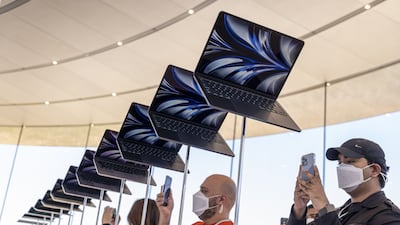Apple, which released its second-generation M2 chips at the Worldwide Developers Conference in June last year, launched its next-generation M2 Pro and M2 Max chips on Tuesday to strengthen its position in the semiconductor industry.
The new chips, designed to reduce Apple's reliance on other chip makers such as Intel, feature a more powerful central processing unit, a graphics processing unit, up to 96GB of unified memory and power efficiency technology, the company said
“Only Apple is building SoCs [systems on a chip] like M2 Pro and M2 Max. They deliver incredible pro performance along with industry-leading power efficiency,” Apple’s senior vice president of hardware technologies Johny Srouji said.

“With an even more powerful CPU and GPU, support for a larger unified memory system, and an advanced media engine, M2 Pro and M2 Max represent astonishing advancements in Apple silicon.”
Apple released its own M1 chips in November 2020, and these were followed by the M1 Pro and M1 Max chips in October 2021. In March last year, Apple unveiled M1 Ultra, which the company claimed to be the world’s most powerful chip for a personal computer.
M2 Pro
Built using a second-generation five-nanometre process technology, M2 Pro consists of 40 billion transistors — nearly 20 per cent more than M1 Pro and double the amount in M2.
Graphics speeds are up to 30 per cent faster than that of M1 Pro, resulting in huge increases in image-processing performance and enabling console-quality gaming.
M2 Max
With 67 billion transistors — 10 billion more than M1 Max and three times that of M2 — M2 Max pushes the performance and capabilities of Apple silicon even further.
Its 400GB-per-second of unified memory bandwidth is twice that of M2 Pro. It enables prompt opening of massive files and smooth working across several pro apps.
How big is the industry?
The global semiconductor market is booming.
Worldwide semiconductor revenue increased 1.1 per cent in 2022 to reach $601.7 billion, up from $595 billion in 2021, according to Gartner. The combined revenue of the top 25 semiconductor vendors increased 2.8 per cent last year and accounted for 77.5 per cent of the market.
South Korean technology manufacturer Samsung led the market with almost 11 per cent market share, whereas Apple stood in 10th place, with 3 per cent market share last year.


